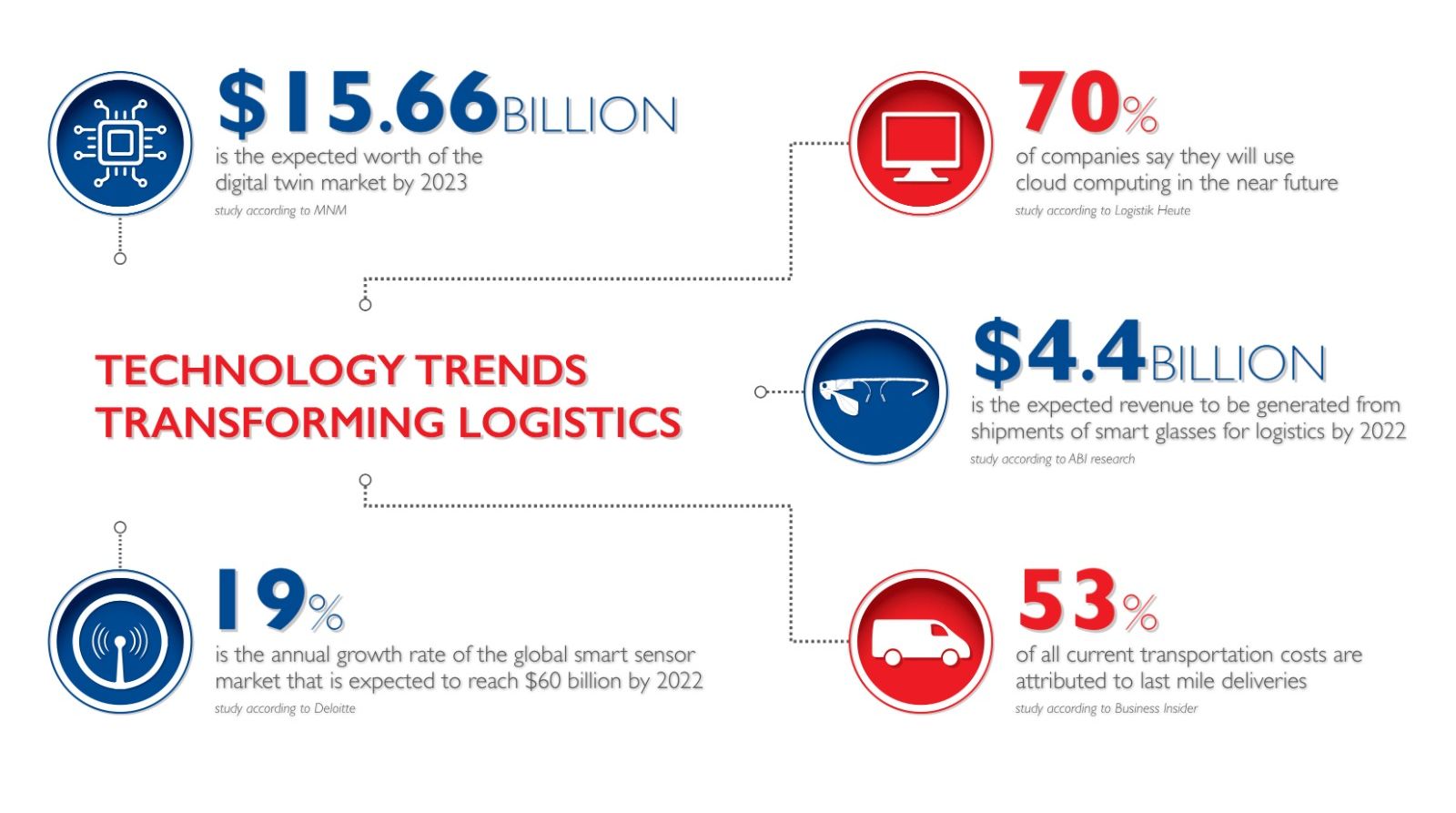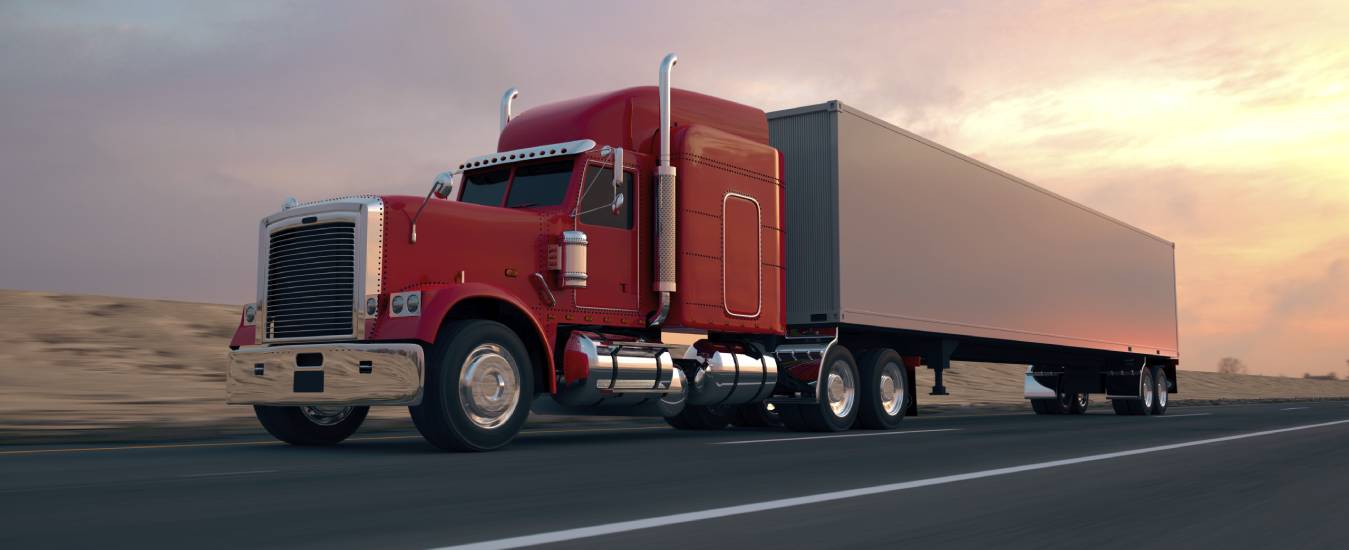Technology has revolutionized the way business is done, pushing the boundaries and expanding possibilities. Today, we have grown accustomed to having everything online and readily available at our fingertips. Thanks to Amazon, the trailblazer of expedited delivery service, you can now receive a package within an hour of ordering, depending on your location. Advanced technology has increased supply chain productivity, reducing costs and errors, and benefiting all facets of the logistics industry, including trucking transportation, international transportation (ocean and air), supply chain management, and shipment tracking. In this article, we will examine five major technological advances that are transforming the future of the logistics industry.
| The technology | The impact | The uncertainties |
|
Physical Internet (based on the IoT) |
|
|
| IT standards |
|
|
| Data analytics |
|
|
| Cloud |
|
|
| Blockchain |
|
|
| Robotics & automation |
|
Speed of technology development unclear |
| Autonomous vehicles |
|
|

E-commerce marketplaces need Logistics Companies
The rise of online marketplaces has made it easier than ever to sell products online, and as a result, the range of available items has greatly increased. However, with this growth comes the need for efficient logistics solutions, especially for small and medium-sized organizations. To meet this demand, modern logistics companies are leveraging technology to offer convenient and reliable services. As a result, many businesses now rely on tech-driven logistics firms to deliver their goods to customers.
According to a study by Logistik Heute, 70% of companies say they will use cloud computing in the near future
Shipment Tracking Systems
Shipment Tracking Systems have revolutionized the logistics industry. In the past, customers had to wait for their shipments without any updates unless they called the carrier. However, advancements in technology have provided customers with easy access to shipping and tracking systems round the clock. This has not only improved the customer experience but has also helped companies save time and money. At T3RA, we offer a top-notch shipment tracking system that allows customers to monitor and manage their shipments. The system offers features like shipment notifications, customizable reporting, and customer accounts with information specific to their cargo. With the integration of cutting edge automation in our platform, we are moving forward to bring even more enhancements to our system. We are committed to delivering our customers’ technological dreams and providing them with an exceptional experience. Visit our website to learn more about it or contact us for further information.
Internet of Things (IoT)
Internet of Things (IoT) has had a significant impact on businesses across various industries, including logistics. This technology has enabled the logistics sector to undergo substantial changes. Businesses can now monitor the temperature and location of their products using IoT-enabled devices. For instance, sensors can be installed in trucks to track their whereabouts, and businesses can use IoT to monitor the state of the products and how they are being handled. This allows logistics companies to manage inventory levels more effectively and optimize their processes. As a result, companies can reduce costs, improve efficiency, offer better customer service, and make faster decisions. The impact of IoT on logistics is continually evolving, and its possibilities are endless.
Deloitte reports the global smart sensor market is growing at a 19% annual rate and is expected to reach $60 billion by 2022
Self-driving vehicles
According to Business Insider, last-mile delivery currently accounts for 53% of all transportation costs. From long-haul journeys to last-mile deliveries, driverless lorries and vans will almost certainly begin making an impact in the next few years as more than 40 companies continue extensive testing of the technology.
Long journeys require a high turnover of drivers and leave a huge carbon footprint. Autonomous tech can be utilized to part drive vehicles and guide them, supporting drivers practically and physiologically on demanding long runs. And it isn’t just for trucks: forklifts, pallet stackers, and other warehouse and worksite machinery will also become at least semi-autonomous.
According to Business Insider, last-mile delivery currently accounts for 53% of all transportation cost
Robotics and automation
Inbound Logistics reports that four-fifths of the world’s warehouses are run manually, offering huge potential for automation in logistics processes.
Robots have begun working collaboratively with humans, reducing repetitive work and providing vital labour at times of worker shortages. Future robotics will only get more sophisticated, with picking, packing, and sorting becoming more commonplace and last-mile deliveries either being carried out autonomously or assistively.
Approximately four-fifths of the world’s warehouses are run manually
Trailer-loading bots will relieve humans of this physically demanding task and utilise AI to load vehicles in the most optimal way.
T3RA logistics is a leading veteran owned digital freight brokerage that has a network of 10,000+ trucks. Currently specializes in moving dry, refrigerated, Full truck load in and out of western 11 states. Contact Us to know more details.

